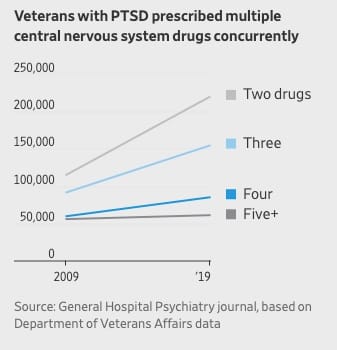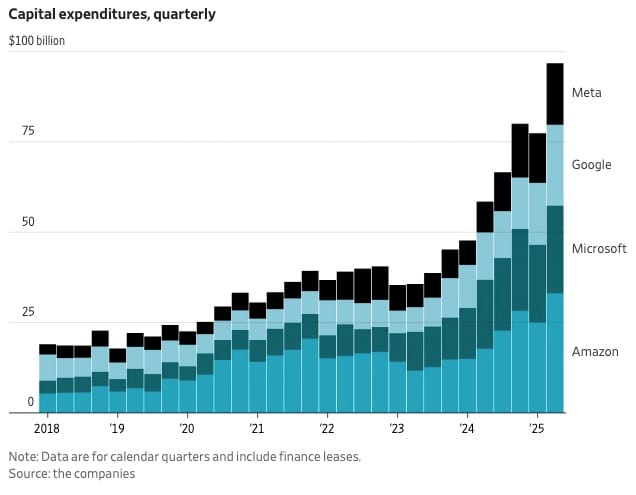August 1 2025
Risky VA PTSD Treatment; Tech Giants' AI Spending; Trump Targets China Transshipments; Student Loan Interest Resumes; US Envoy to Gaza

VA Treats PTSD with Risky Drug Cocktails, Affecting Hundreds of Thousands
Tech Giants Pour Billions Into AI, Propelling Market Caps Past Trillions
Trump Targets China's Tariff Workaround with New 40% Levy on Transshipments
Interest to Resume on SAVE Loans, Threatening Higher Payments for 8 Million
Trump Dispatches Envoy to Gaza to Craft New Plan for Humanitarian Aid
Newsletter sponsor

1. VA Treats PTSD with Risky Drug Cocktails, Affecting Hundreds of Thousands
Hundreds of thousands of veterans with PTSD have been prescribed simultaneous doses of powerful psychiatric drugs. The practice, known as “polypharmacy,” can tranquilize patients to the point of numbness, cause weight gain and increase suicidal thoughts when it involves pharmaceuticals that target the central nervous system, according to scientific studies and veterans’ accounts. The VA’s own guidelines say no data support drug combinations to treat PTSD. The Food and Drug Administration warns that combining certain medications such as opioids and benzodiazepines can cause serious side effects, including death. Nonetheless, prescribing cocktails of such drugs is one of the VA’s most common treatments for veterans with PTSD, and the number of veterans on multiple psychiatric drugs is a growing concern at the agency, according to interviews with more than 50 veterans, VA health practitioners, researchers and former officials, and a review of VA medical records and studies. Polypharmacy has multiple definitions when it comes to central nervous system drugs. The VA defines it as taking five or more medications at the same time, while some medical researchers say it’s two or more and the American Geriatrics Society defines it as three or more. There is an emerging medical consensus among VA doctors and researchers that taking multiple central nervous system drugs can wreak havoc on patients. Interactions between such drugs aren’t well understood, and their effects in combination can be unpredictable and extreme. The VA maintains that the best treatment for PTSD is talk therapy. But therapists are scarce and wait times are long, so overwhelmed doctors default to pills. Because there is no single drug designed specifically to treat PTSD, veterans often end up on drug cocktails as multiple specialists try to ease a variety of symptoms and prevent harm or suicide, according to VA clinical staff, studies and veterans. Nearly 60% of VA patients with PTSD were taking two or more central nervous system drugs at the same time in 2019, the latest year for which data are publicly available, according to a VA study. That works out to more than 520,000 patients, up 62% from a decade earlier, driven by a near doubling of the number of VA patients with PTSD due to more combat tours and better screening.

WSJ
2. Tech Giants Pour Billions Into AI, Propelling Market Caps Past Trillions
The AI arms race is accelerating as the major tech companies add to their already gargantuan levels of spending. The bets are paying off for investors, but not for all employees. Alphabet’s Google, Microsoft, Amazon and Meta Platforms are set to spend nearly $400 billion this year on capital expenditures, largely to build their artificial-intelligence infrastructure. That is more than the European Union spent on defense last year. Those firms and others plan to boost outlays even more. Morgan Stanley projects $2.9 trillion in spending from 2025 to 2028 on chips, servers and data-center infrastructure. The investments, the bank says, will contribute as much as 0.5% of U.S. gross domestic product growth this year and next. The investments are helping power big increases in the companies’ profits, pushing some of their share prices to records. Wall Street often looks down on excessive corporate spending. But not here. Microsoft and Meta shares soared Thursday after they reported earnings—and their sizable capital spending—reaching market capitalizations of $4 trillion and nearly $2 trillion, respectively. Also booming is Nvidia, which designs the chips that tech companies primarily use to build their AI models. It was the first company to surpass $4 trillion in market capitalization. Its shares are up more than 28% this year.

WSJ
3. Trump Targets China's Tariff Workaround with New 40% Levy on Transshipments
Ever since President Trump began raising tariffs on goods from China during his first term, Chinese companies have raced to set up warehouses and factories in Southeast Asia, Mexico and elsewhere to bypass U.S. tariffs with indirect shipments to the American market via other countries. But on Thursday, Mr. Trump took aim at all indirect American imports, which he blames for part of the $1.2 trillion U.S. trade deficit. The president imposed 40 percent tariffs on so-called transshipments, which will take effect in a week. And a senior administration official who briefed reporters said work was underway that could broaden considerably the definition of indirect shipments.
NYT
4. Interest to Resume on SAVE Loans, Threatening Higher Payments for 8 Million
Millions of student-loan borrowers are bracing for significantly higher monthly payments after the Trump administration moved to wind down one of the federal government’s most affordable repayment options. Interest was set to start accruing again Friday for the nearly eight million people enrolled in the Saving on a Valuable Education Plan, or SAVE. The Education Department said it is making the change to comply with a federal court injunction that blocked the plan, which was introduced under the Biden administration. The loans remain in forbearance while courts decide SAVE’s future, meaning borrowers still aren’t required to make monthly payments. But the change, coupled with the Trump administration’s plan to eventually phase out the program as part of a retreat from federal student loans, has some borrowers casting about for different options.
WSJ
5. Trump Dispatches Envoy to Gaza to Craft New Plan for Humanitarian Aid
WASHINGTON—U.S. Middle East envoy Steve Witkoff is set to visit the Gaza Strip on Friday to develop a new aid-distribution plan, the White House said Thursday, part of the Trump administration’s push to alleviate the deepening humanitarian crisis. Witkoff, who will be accompanied by U.S. Ambassador to Israel Mike Huckabee, intends to brief President Trump shortly after the mission to the enclave. What Witkoff sees will inform a new strategy to feed a territory suffering from famine-like conditions, according to humanitarian groups and monitors. The visit will include an inspection of current distribution sites and meeting with locals, White House press secretary Karoline Leavitt said. Witkoff and Huckabee would then discuss a “final plan for food and aid distribution into the region” with Trump, she added.
WSJ
August 1, 1861: World’s first weather forecast published
The report, which included a prediction of 62 degrees and clear skies in London, was largely accurate.
Sign up for local news delivered to your inbox in:
Many more cities coming soon!
Sponsors (click me!)





Sources
- https://www.wsj.com/health/healthcare/veterans-affairs-ptsd-polypharmacy-3c9673ac
- https://www.wsj.com/tech/ai/tech-ai-spending-company-valuations-7b92104b?mod=hp_lead_pos3
- https://www.nytimes.com/2025/08/01/business/trump-tariffs-china-transshipment.html
- https://www.wsj.com/personal-finance/millions-of-student-loan-borrowers-prepare-for-higher-payments-4d2f466d?mod=hp_lead_pos11
- https://www.wsj.com/world/middle-east/u-s-envoy-steve-witkoff-to-visit-gaza-as-trump-under-pressure-seeks-aid-plan-b0c057cf?mod=hp_lead_pos6
See the citizen journal Podcast! Released on Apple, Spotify and YouTube around 10a CST.
SUBSCRIBE TO GET THE CITIZEN JOURNAL IN YOUR INBOX - FREE!
subscribe/unsubscribe to city emails, subscribe to app notifications, get the app
Contact: greg@citizenjournal.us

